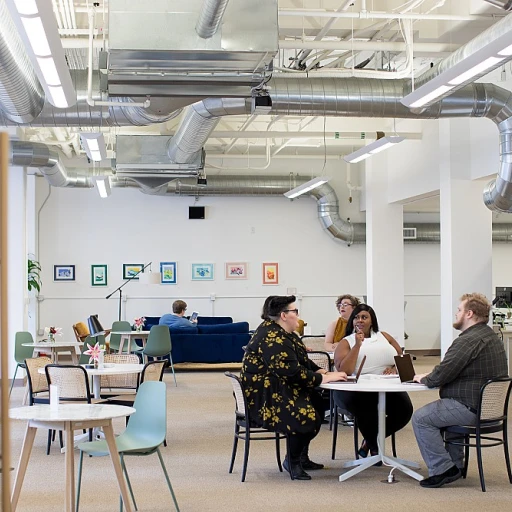
Understanding High Potential Employees
Navigating the Landscape of High Potential Employees
Understanding high potential employees is crucial for organizations aiming for sustainable growth and success. These individuals consistently demonstrate exceptional performance and exhibit the capacity to take on more significant responsibilities. Recognizing and nurturing their talents through a structured mentoring program can be the difference between stagnation and progress. High potential employees are often characterized by their keen ability to communicate effectively, solve complex problems, and show remarkable adaptability. These skills set them apart in the competitive business environment. But what truly defines them is their consistent drive for professional growth and eagerness to learn new skills. To help them achieve their potential, businesses often implement specific mentoring sessions tailored to their needs. These mentoring programs are designed to offer guidance, support, and real-time feedback on their performance. As they climb up the corporate ladder, having a seasoned mentor will empower them to make informed decisions, tackle challenges, and inspire their peers. For companies, identifying these individuals early on can lead to better strategic planning and workforce management. They play a critical role in talent retention and are potential candidates for leadership roles in the future. By implementing a privacy policy that ensures trust and confidentiality, companies can enhance the effectiveness of their mentoring relationships. Moreover, a high potential employee's willingness to engage in meaningful dialogue and ask specific questions during these mentoring sessions can enhance the mentor-mentee relationship. Understanding one's role as a mentee, being proactive, and displaying the initiative to learn from their mentor will help in defining their career trajectory. For more insights into how high potential employees can unlock their potential, feel free to read more about the journey of mReach mentees.The Role of Mentorship in Career Development
The Transformative Power of Mentorship in Career Paths
Mentorship plays a crucial role in shaping the career paths of high potential employees. It serves as a bridge between the acquisition of fundamental skills and the application of those skills in real-world scenarios. When embarking on a mentoring relationship, high potential employees have the opportunity to learn not only the technical aspects of their jobs but also the subtle nuances of excellent professional growth. During mentoring sessions, mentors share insights rooted in personal experiences, providing mentees with a clearer understanding of their business environment. Lessons learned from a seasoned mentor will help mentees navigate challenges more effectively. By posing specific questions during these interactions, mentees can gain clarity on complex topics and further refine their problem-solving abilities. Furthermore, a mentor will guide their mentee in exploring diverse work strategies that accommodate different business dynamics. This allows high potential employees to incorporate versatility into their skillsets, making them valuable assets to any organization. Finding the right mentor requires a mindful approach. Consider what you aim to achieve from the mentorship program. Ideally, align yourself with a mentor whose experience resonates with your aspirations—whether you're seeking guidance in life business matters or looking to thrive in the competitive landscapes of small businesses or real estate in the United States. By investing in a robust mentoring program, both organizations and aspiring talents can benefit enormously. For those interested in building effective mentorship strategies, consider exploring this insightful piece on crafting an effective mentorship program template for high potential employees that offers comprehensive guidance on structuring valuable mentor-mentee relationships. Ultimately, the questions mentors encourage their mentees to confront will unlock new perspectives, fostering a journey of continuous learning and self-improvement in both life and business. Investing time in reading a relevant book or engaging in a structured mentoring program might be the pivotal step towards a fulfilling professional life.Challenges Faced by High Potential Employees
Overcoming Common Obstacles in Professional Growth
As high potential employees navigate their career trajectories, numerous challenges can arise. While the support of a mentor in a structured mentoring program can be invaluable, understanding and addressing specific hurdles is crucial for effective growth.
One common challenge involves the balancing act between ambitious career goals and current job responsibilities. High potential employees often have substantial responsibilities in their roles, but they are eager to expand their skills to ensure continual advancement. This can lead to a heavy workload, resulting in burnout if not carefully managed. In such cases, a mentor can help prioritize tasks, set realistic goals, and manage time efficiently.
Another potential obstacle is the pressure to constantly perform at a high level, which might lead to stress and self-doubt. Mentors can assist mentees in acknowledging their progress and celebrating achievements, fostering greater confidence. This is important in life and business, as a strong belief in one's capabilities is crucial for success.
Navigating workplace politics can also pose a challenge. Building strong relationships with colleagues and managing up are essential skills, yet they are not always intuitive. Mentorship can provide guidance and strategies to effectively manage workplace dynamics, making it easier for high potential employees to thrive within their organizations.
Communication barriers might also arise from a lack of experience or varying expectations between mentors and mentees. Effective communication is vital, and mentors can role model how to address specific questions or situations professionally during each mentoring session.
Recognizing these challenges and actively seeking to overcome them through the right mentoring relationship will help high potential employees maximize their professional growth and contribute effectively to their organizations.
Finding the Right Mentor
Navigating the Mentor Search: Identifying the Best Fit
Embarking on the journey to find the right mentor is a pivotal part of professional growth for any high potential employee. It's important to understand the value of a suitable mentorship as it can greatly influence your career trajectory.
When you're in the initial phases of determining the ideal mentor, consider the following criteria to guide your search:
- Shared Values and Goals: Your mentor should have values and professional aspirations that align with your own. This synergy ensures a more fulfilling mentorship experience.
- Relevant Experience: Look for mentors who have navigated similar paths or industries, such as real estate or small business, and can offer valuable insights based on their experiences.
- Willingness to Invest Time: A mentor willing to actively invest in your development through regular mentoring sessions and feedback is crucial. Their dedication will help foster a beneficial mentor-mentee relationship.
- Ability to Challenge and Support: The ideal mentor will balance challenging you to break your comfort zone while providing the necessary support and assistance. This approach nurtures growth in skills and professional capabilities.
Once you have these aspects in mind, it's time to reach out. Networking within your industry, attending relevant events, or even leveraging platforms dedicated to mentoring programs in the United States can be excellent ways to connect. Don't be afraid to initiate conversations and ask questions that reflect your genuine curiosity and commitment.
Remember, the process of finding a mentor may take time, but being proactive and maintaining an open mind can lead you to a fruitful life and career partnership. This relationship will not only help in achieving your goals but also in navigating the complexities of business and life with greater confidence and wisdom.
Building a Successful Mentor-Mentee Relationship
Fostering a Meaningful Connection
Building a successful mentor-mentee relationship is akin to nurturing a small business; it requires time, effort, and a clear understanding of mutual goals. The foundation of this relationship lies in open communication and trust. A mentor will help guide you through the complexities of your professional journey, but it’s crucial to establish a rapport where both parties feel comfortable sharing insights and challenges.
Setting Clear Expectations
At the outset, it’s important to define what both the mentor and mentee hope to achieve. This can be done by asking specific questions about career aspirations, skills development, and personal growth. A well-structured mentoring program often includes setting short-term and long-term goals, which can be revisited in each mentoring session to track progress.
Active Engagement and Learning
Engagement is key in any mentoring relationship. As a mentee, actively participate in discussions, seek feedback, and be open to constructive criticism. Reading books or articles recommended by your mentor can also provide valuable insights and broaden your perspective. Remember, the more you invest in this relationship, the more you will learn and grow.
Respecting Boundaries and Privacy
While it’s important to build a close relationship, respecting each other’s boundaries is crucial. Adhering to a privacy policy within your mentoring relationship ensures that sensitive information shared during your sessions remains confidential. This mutual respect fosters a safe environment where both mentor and mentee can thrive.
Continuous Improvement
Finally, like any successful business or life endeavor, continuous improvement should be a priority. Regularly evaluate the effectiveness of your mentoring relationship and be open to making adjustments. Whether you’re in the United States or elsewhere, the principles of a strong mentor-mentee relationship remain the same: communication, respect, and a shared commitment to professional growth.
Real-Life Stories: How My Mentor Made a Difference
How My Mentor Revolutionized My Path
In the ever-evolving landscape of high potential employees, the pivotal role of mentors cannot be overstated. My personal journey has been significantly influenced by mymentor, whose guidance helped shape my career trajectory, skills, and professional growth. Like many mentees, I faced challenges in navigating the complexities of business life. Mymentor, through a structured mentoring relationship, became the cornerstone of my professional development.
The most profound impact mymentor had was by asking the right questions. Instead of providing direct answers or solutions, mymentor encouraged me to delve deeper into my thoughts and analyze my situations critically. This method was instrumental in empowering me with lifelong skills that extended beyond my current job role or industry, applicable even in fields such as real estate or small business management.
An aspect of our mentoring sessions that stood out was the inclusion of a tailored mentoring program, where specific goals were set. With a focus on privacy policy and user agreement, every session remained confidential, fostering trust and openness. The structured nature of the program ensured that our interactions had clear objectives aligned with my career aspirations.
Reading became an integral part of mentoring. Mymentor recommended books that aligned with my career goals and personal interests. "This Will Help You Grow" and other books were part of my reading list, allowing me to gain insights that complemented our direct discussions. The importance of continuous learning was emphasized, prompting me to read book after book, each contributing to my growth.
Through mymentor's guidance, I learned the art of asking specific questions and understanding their relevance in both personal and professional contexts. It became clear that a successful mentor mentee relationship is a two-way street, where both parties contribute to the learning process. Reflecting on my experiences, I can attest that their guidance has been instrumental, helping me navigate the labyrinth of the professional world with confidence and direction.













